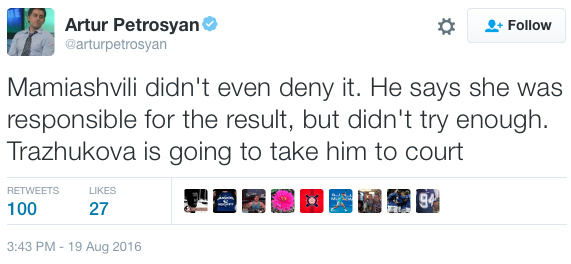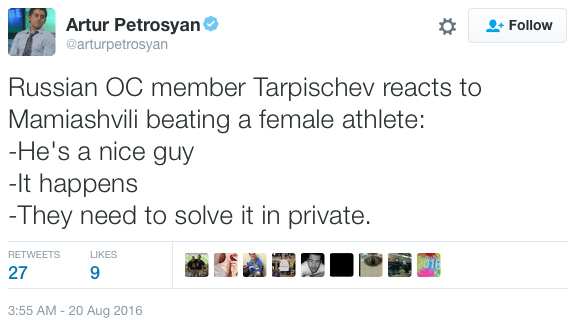Monika Ewa Michalik of Poland (Red) and Inna Trazhukova of Russia (Blue) in action during the women's Freestyle 63kg bronze medal bout (Ilnitski/EPA)Former Soviet Union states—especially Russia—have an extensive history of success in both freestyle and Greco Roman wrestling disciplines in the Olympics.However, the 2016 Rio Olympics went a little different for the Russian wrestling powerhouse. Their delegate of wrestlers were within a whisker of not being able to compete in this year's Games thanks to the Russian doping scandal which rocked the country and sports worldwide.Doctor Grigory Rodchenkov was the head of the now-discredited Moscow-based sports laboratory that looked after drug samples taken from Russian athletes at the behest of the World Anti-Doping Agency (WADA). Rodchenkov, who was once awarded the prestigious Order of Friendship by Russian President Vladimir Putin, soon went rogue and turned whistleblower—detailing the years of state-sponsored doping authorized by the Russian political machine. Fearing for his life, Rodchenkov sought asylum in the United States following his allegations, which led to the McLaren report that implicated Russia.A blanket ban was imposed on Russian track and field athletes by the International Olympic Committee (IOC) with few notable exceptions, while the IOC left it to individual sports federations to determine whether they would like to ban Russian athletes from their respective sports. It wasn't a popular decision among the vast majority of IOC members from different countries—a decision seen as a cop-out to avoid further trouble from a powerful nation that relies on its sporting stars to promote a positive image to the rest of the world.United World Wrestling (UWW), the official wrestling body which works alongside the IOC for the Olympics, cleared 16 of Russia's 17-strong team for Rio, with Viktor Lebedev omitted due to already serving a doping ban—his place in the 57kg event going to Belarus.Wrestling is a big deal for Russian sport. The country's wrestling team won 11 medals in the previous Olympic Games in London; a haul which included four gold medals. 28 of the manipulated drug tests were attributed to Russian wrestlers, so it was expected that Russia would face a harsher punishment from this particular sporting body. Alas, Russian wrestling stars such as UFC-bound Bilyal Makhov and Roman Vlasov were allowed to compete at this year's Games.It was a decision greeted warmly by the Russians, and one which helped propel them to fourth place in the medal table—only behind the US, Great Britain and China. The Russians dominated the wrestling mat, leading the way with nine medals with four being gold, beating the likes of Japan, Cuba, the USA and Turkey who make up the rest of the top five nations.In fact, it was wrestling in particular which helped the Russians stay within the top five of the overall medal table. Fencing drew four golds for Russia and seven medals overall, while the nearest sport to that were Russia's efforts in rhythmic gymnastics, which garnered two gold medals, three overall.***The aforementioned Roman Vlasov and his achievement of claiming gold medals in two consecutive Olympics in the Greco-Roman 75kg weight category was a nice positive story for Russia. Unfortunately for Makhov, he was a major first round casualty as he lost 3-1 to top-level naturalised Ukrainian wrestler Alen Zaseev. However, as is always the case with Russia, there is always a behemoth-sized controversy lurking behind any success they initially enjoy.It should have been a time to quietly commiserate for wrestler Inna Trazhukova, who lost her bronze medal match for the 63kg category last Thursday. However, according to Russia's Sport-Express, Trazhukova was both verbally and physically abused by the head of the Russian Wrestling Federation, Mikhail Mamiashvili.The Sport-Express report quotes Trazhukova as saying (in Russian) that Mamiashvili was drunk and shouted obscenities at her before punching her in the face twice in front of witnesses. She then expressed her desire to file charges against Mamiashvili. "He embarrassed me in public. I want to stop this so female athletes in the future don't suffer because of him," said Trazhukova.The same report states that Mamiashvili vehemently denies hitting Trazhukova. But, he doesn't deny scolding her with some harsh words following her failed attempt at retrieving a bronze medal, claiming she didn't act honorably and gave away the medal by not wanting to compete.
 Russian-based sports journalist Artur Petrosyan's tweets are disappointing to say the least. Ordinarily, this should be a time for the Russians to celebrate its wins despite encountering such adversity before this year's Olympic Games. But, Mamiashvili has helped undermine that by unapologetically berating Trazhukova for her loss—regardless of whether the additional charges made against him are accurate or not.In addition to Mamiashvili's confirmed actions and allegations, it's unclear whether anything will actually come of Trazhukova's accusations and subsequent filed charges—he's a big deal in both Russia and in the wrestling landscape.An ethnic Georgian, Mamiashvili was one of the most successful Greco-Roman wrestlers in the history of the Soviet Union. He won Olympic gold in the 1988 edition of the Games in Seoul, South Korea. In addition to that medal, Mamiashvili also won three golds and two silvers in the World Championships to complement his three European Championship gold medals.On top of that, he is the chairperson and Vice President of the aforementioned United World Wrestling—the sport's governing body. Meanwhile, Russian Sports Minister, Vitaly Mutko, the man Trazhukova is expected to file her charges to, told Sport-Express it is difficult for him to make a decision about something that happened in Rio de Janeiro while he's in Moscow. Those words will not fill Trazhukova with confidence in the slightest.Russia's wrestling contingent almost single-handedly salvaged some semblance of sporting pride through the Olympics. But, in one fell swoop—or the mouth and alleged clenched fists of Mamiashvili—Russian sport has yet another controversy to its credit despite a contextually successful Olympic Games.
Russian-based sports journalist Artur Petrosyan's tweets are disappointing to say the least. Ordinarily, this should be a time for the Russians to celebrate its wins despite encountering such adversity before this year's Olympic Games. But, Mamiashvili has helped undermine that by unapologetically berating Trazhukova for her loss—regardless of whether the additional charges made against him are accurate or not.In addition to Mamiashvili's confirmed actions and allegations, it's unclear whether anything will actually come of Trazhukova's accusations and subsequent filed charges—he's a big deal in both Russia and in the wrestling landscape.An ethnic Georgian, Mamiashvili was one of the most successful Greco-Roman wrestlers in the history of the Soviet Union. He won Olympic gold in the 1988 edition of the Games in Seoul, South Korea. In addition to that medal, Mamiashvili also won three golds and two silvers in the World Championships to complement his three European Championship gold medals.On top of that, he is the chairperson and Vice President of the aforementioned United World Wrestling—the sport's governing body. Meanwhile, Russian Sports Minister, Vitaly Mutko, the man Trazhukova is expected to file her charges to, told Sport-Express it is difficult for him to make a decision about something that happened in Rio de Janeiro while he's in Moscow. Those words will not fill Trazhukova with confidence in the slightest.Russia's wrestling contingent almost single-handedly salvaged some semblance of sporting pride through the Olympics. But, in one fell swoop—or the mouth and alleged clenched fists of Mamiashvili—Russian sport has yet another controversy to its credit despite a contextually successful Olympic Games.
Advertisement
Advertisement
Advertisement

